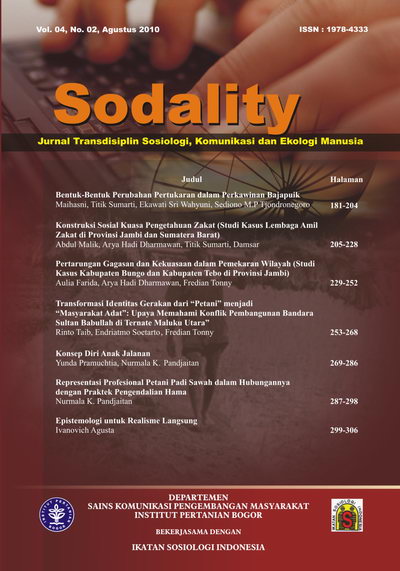Konstruksi Sosial Kuasa Pengetahuan Zakat : Studi Kasus Lembaga Amil Zakat di Propinsi Jambi dan Sumatera Barat
Abstract
The governances of zakat is important to be studied, especially about the dynamics of knowledge, rationality, and interest in zakat governance. This study focused on the battle of knowledge, rationality and conflicts of interest in zakat governance. The approach in this study is a qualitative approach with a methodology constructivism paradigm. The data obtained by phenomenology method with depth interview techniques and documentation. Data were analyzed using structural conflict perspective with Foucaultian style, especially the theory of power and knowledge. The results showed that: there are three spheres of knowledge, that competing to get authorities in the governance of zakat (religious knowledge, modern knowledge and local knowledge). The discourse of the governance of zakat in the LAZ of community was dominated by the religious knowledge and local knowledge, while at the Bazda and LAZ of Semen Padang, discourse is dominated by modern knowledge. Second, the rationality of LAZ of community is asceticism and altruism with the interests of individual piety and social piety, but the rationality of Bazda is developmentalism to achieve integration and uniformity, while the rationality of LAZ Semen Padang is maximize Utility, with profit interests and investment security. Finally, the phenomenon of zakat governances was showed as moral laundering efforts
Published
2010-05-03
How to Cite
MalikA., Hadi DharmawanA., & SumartiT. (2010). Konstruksi Sosial Kuasa Pengetahuan Zakat : Studi Kasus Lembaga Amil Zakat di Propinsi Jambi dan Sumatera Barat. Sodality: Jurnal Sosiologi Pedesaan, 4(2). https://doi.org/10.22500/sodality.v4i2.5847
Section
Articles
Authors who publish with this journal agree to the following terms:
- Authors retain copyright and grant the journal right of first publication with the work simultaneously licensed under a

This work is licensed under a Creative Commons Attribution 4.0 International License. that allows others to share the work with an acknowledgement of the work's authorship and initial publication in this journal. - Authors are able to enter into separate, additional contractual arrangements for the non-exclusive distribution of the journal's published version of the work (e.g., post it to an institutional repository or publish it in a book), with an acknowledgement of its initial publication in this journal.
- Authors are permitted and encouraged to post their work online (e.g., in institutional repositories or on their website) prior to and during the submission process, as it can lead to productive exchanges, as well as earlier and greater citation of published work (See The Effect of Open Access).





.png)









